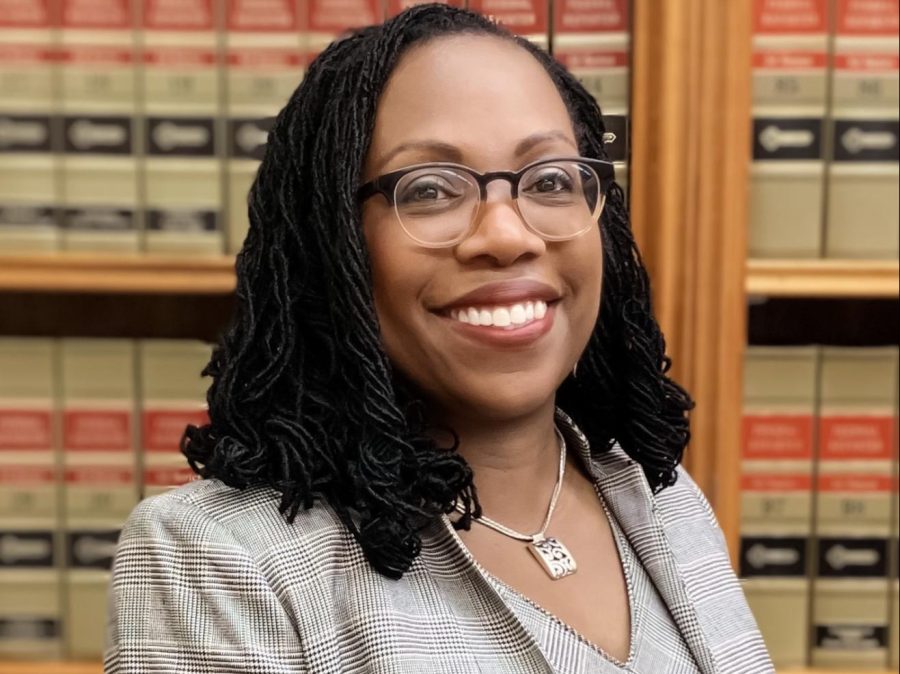Judge Jackson to be the First Black Woman on the Supreme Court
February 28, 2022
On the morning of February 25th, President Biden announced his nominee for the 116th Associate Justice of the United States Supreme Court: Judge Ketaji Brown Jackson, the first Black woman to be nominated for this position. Judge Jackson currently serves on the U.S. Court of Appeals for the D.C. Circuit. She will now undergo the approval process, and if confirmed, will take the seat of retired Justice Stephen Breyer.
“Judge Jackson is one of our nation’s brightest legal minds and has an unusual breadth of experience in our legal system, giving her the perspective to be an exceptional Justice,” states the White House website for Judge Jackson.
Judge Jackson has dedicated her life to the law and justice.
“She traced her love of the law back to sitting next to her father in their apartment as he tackled his law school homework—reading cases and preparing for Socratic questioning—while she undertook her preschool homework—coloring books,” states the White House.
She graduated magna cum laude from Harvard University and cum laude from Harvard Law School, despite her high school guidance counselor advising her to not set her “sights so high” by applying to Harvard.
Judge Jackson also has the traditional experience expected from a Supreme Court nominee. In 2012, Judge Jackson was nominated by President Obama for the U.S. District Court for the District of Columbia where she was confirmed a year later with bipartisan support. Last year President Biden nominated Judge Jackson to the U.S. Court of Appeals for the D.C. Circuit where she was again, confirmed with bipartisan support.
In addition to her work on the courts, Judge Jackson served as the Vice Chair of the U.S. Sentencing Commission in 2009. The Commission works to reduce disparities and promote transparency and fairness in sentencing. Her work on the Commission was centered on ensuring federal sentences were just.
Judge Jackson previously represented defendants who could not afford a lawyer, making her the first former federal public defender to serve on the Supreme Court. Never before has a justice brought to the Court such extensive experience representing criminal defendants, many of whom face a criminal justice system that is unrelenting on communities of color. This experience equips Judge Jackson to bring a unique and important perspective to the Court.
Last year, during her confirmation hearings for the Court of Appeals, Judge Jackson said she was inspired to work as a public defender after working for the sentencing commission.
“I soon discovered that I lacked a practical understanding of the actual workings of the federal criminal justice system,” said Judge Jackson during her hearing, “I decided that serving ‘in the trenches,’ so to speak, would be helpful.”
Judge Jackson will take the seat of her former mentor, Justice Stephen Breyer, who is retiring from the Supreme Court at the end of the 2021-22 term. She served as Justice Breyer’s law clerk which allowed her to personally learn from a careful and pragmatic justice.
“Breyer shunned rigid approaches to legal interpretation, often seeking functional rulings with an eye toward real-world consequences,” states the SCOUTS blog. Justice Breyer authored opinions in favor of reproductive rights and often challenged the constitutionality of the death penalty.
“Judge Jackson is a nominee worthy of Justice Breyer’s legacy of excellence and decency” says President Biden on twitter.
Justice Breyer’s retirement provides President Biden the opportunity to fulfill a campaign promise to nominate the first Black woman to the U.S. Supreme Court.
Now that President Biden has nominated Judge Jackson to the Supreme Court, the process moves to the Senate Judiciary Committee where they will vet the nominee’s qualifications and background. The Committee will then schedule their first hearing with Judge Jackson where they will inquire about her qualifications and Judge Jackson will be given the opportunity to reply.
Next, the Committee convenes a vote on whether or not to recommend to the full Senate that Judge Jackson be confirmed. The nominee is provided the option to withdraw from consideration at any time.
Finally, the entire Senate debates the Supreme Court Justice nominee before the final vote takes place. A simple 51-majority is required for approval. If approved, Judge Jackson will then be sworn in to serve on the highest court. This process takes, on average, 67 days to complete.
If all goes as the President intends, before the end of the year America will be celebrating the confirmation of the first Black woman to sit on the U.S. Supreme Court.




